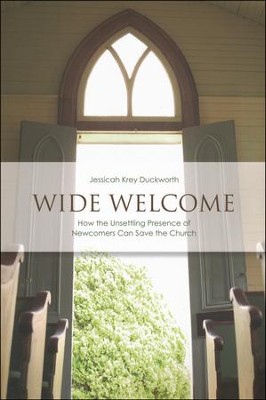 |
| Wide Welcome by Jessicah Krey Duckworth (c) 2013 by Fortress Press, Minneapolis. |
"Congregational life today for many Christians is much more an experience of organizational membership...it usually does not matter what expectations or intuitions newcomers bring to a congregation, because what newcomers encounter is a comfortable, closed gathering in which their presence is not necessarily needed."
"To be a Christian church is for the people under the cross to practice a confession of faith, hope, and love, welcoming newcomers into discipleship practices where faith meets doubt, hope meets despair, and love meets the suffering world."
--Jessicah Krey Duckworth, Wide Welcome: How the Unsettling Presence of Newcomers Can Save the Church, from the Introduction.
Full confession: I count Jessicah Krey Duckworth and her husband Chris as friends in addition to being colleagues in ministry, so I was predisposed to think highly of this book before I even cracked the cover. That having been said, I think Wide Welcome brings a needed and valuable point of view to those of us who are concerned with the future of the church, particularly as the church moves from the age of American Christendom to the emergence of whatever is coming next.
What Wide Welcome argues is this: established churches rarely have any idea how to do ministry outside of the zone within which they have lived for most of their history. Professor Duckworth engages in the imagery of the sand castle to describe a way forward for congregations: rather than constructing an edifice designed to stand static and strong throughout the rest of time (and thus becoming incredibly resistant to change), Christian churches should accept the temporary, shifting, impermanent status of constantly building, deconstructing and rebuilding themselves, and in so doing welcoming both newcomers for whom faith and discipleship is a new thing AND re-engaging "oldcomers" for whom discipleship can also be re-energized by the questions of newcomers.
Along the way, Prof. Duckworth identifies a number of problems standing in the way of genuine engagement of newcomers: ethnic and cultural expectations, failure to recognize the fluid nature of contemporary American religious identity, inability to create the vulnerability wherein a congregation might be changed by its new membership, generational ghettoization (especially within congregations that might provide the only inter-generational experience people have currently), and difficulties moving newcomers into the daily faith practices of congregations. The sum total of what Prof. Duckworth identifies is a bit dizzying for someone like myself who has lived in the confines of one liberal American Protestant denomination his entire life (the Evangelical Lutheran Church in America). I'm sort of the poster child of an establishment legacy, trying to do ministry in an established church that is going to need to learn how to live in disestablishment if it is to survive the next 100 years.
Thankfully, Prof. Duckworth has some ideas for how churches can design and practice that disestablishment. There are helpful sections for leaders, pastors and other brokers within faith communities on breaking down old systems designed for establishment churches and building new practices to welcome and engage newcomers and old comers alike. Finally, Prof. Duckworth identifies the future of the church as an ecclesia crucis, a church of the cross:
"Established members within a congregation are always strangers, newcomers within evangelical worship. Established members are strangers, welcomed over and over, again and again - daily - to the central practice of word and sacrament and the mutual conversation and consolation of the sisters and brothers. As they are shaped by these practices of daily dying and rising, Christ confronts them with truth, reminds them of their dependence upon God, and grants grace for the courage to become disciples - again." (Wide Welcome, p. 107)In our drive to construct and ensure the future of the church, we tend to forget that this world is God's beach, and on it the best any of us can hope to do is build beautiful sandcastles (if I might shamelessly borrow a metaphor). Newcomers and oldcomers alike are called to join in the task of building together, not for the sake of ourselves, or the castles, but for the One on whose beach we are privileged to live. Wide Welcome encourages those of us leading churches to engage in the practice of disestablishment, not for our sake, or even the sake of those we seek to welcome, but for God's sake, as a reminder that this church is not our own. It's a point well worth remembering and sharing with others.
No comments:
Post a Comment